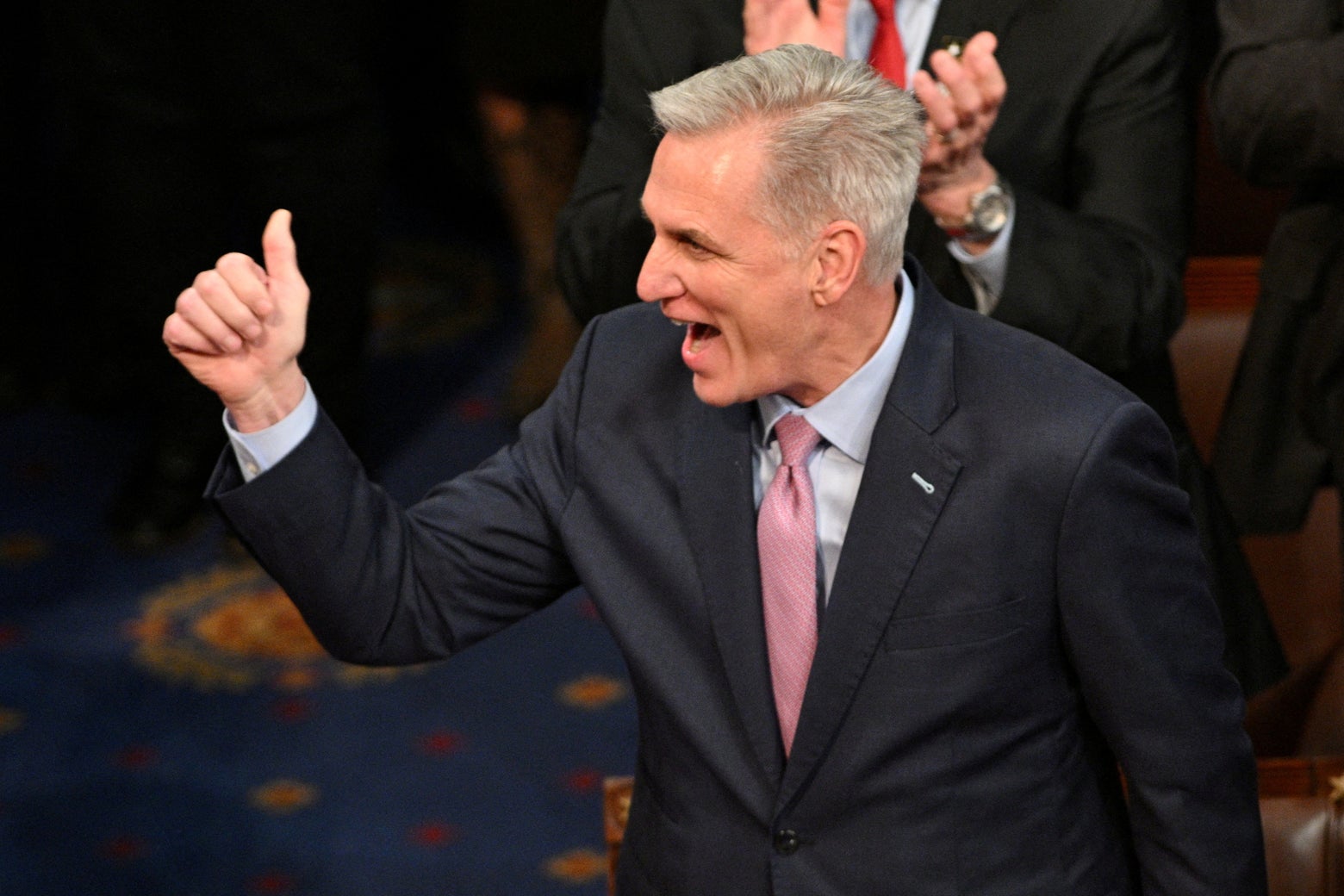
House Speaker Kevin McCarthy’s agreement to cut $75 billion from the defense budget—part of his deal with the hard-right Freedom Caucus to win the chamber’s top slot after falling short 14 times—is less drastic than its critics on both sides of the aisle are claiming.
First, it’s not a cut. Rather, it’s part of a wider budget freeze and, in that sense, an agreement not to go through with an enormous defense increase that Congress approved just last month.
Second, even a defense-budget freeze probably won’t happen, as too many lawmakers—Republicans and Democrats, in the House and the Senate—want, and will demand, a huge spending hike.
But the deal between McCarthy and his party’s far-right wing does foretell a messy floor fight on foreign and military policy, along with the slew of impending fights on a dozen other issues. In particular, the deal raises genuinely serious concerns about how much economic and military aid the Biden administration will be able to continue sending Ukraine in the coming year.
Let’s take a look at the basics. In December, by an overwhelming bipartisan majority, Congress passed a military spending bill for fiscal year 2023 totaling $847 billion. This constituted a $45 billion increase over Biden’s budget request—which itself was $30 billion more than the budget approved for fiscal year 2022. All told then, December’s spending bill amounted to a $75 billion increase over last year’s bill.
[Read: There Is No Good Reason for a Defense Budget This Large.]
In other words, McCarthy’s deal to reduce the military budget by $75 billion isn’t really a cut—it’s a freeze at 2022 levels.
It would be easy, in theory, to remove the $45 billion that Congress tacked on last month. The House and Senate conferees simply, and for no good reason, tacked on $45 billion worth of programs that the top generals and admirals had requested but that the civilian leaders of the Pentagon and the White House rejected as lesser priorities. All the new Congress would have to do is reverse the overly extravagant gesture by the old Congress.
But most members of the new Congress were also in the old Congress, and there’s no sign that they’ve changed their minds. Nor would the new Republican House leaders be inclined to pay fealty to Biden’s original budget request.
The $30 billion increase in Biden’s original budget proposal could also be trimmed without much effort. For instance, that budget included $51 billion for nuclear weapons—a $9 billion increase, which could be eliminated plus some.
But nobody is going to cut these sums. Biden’s $30 billion increase, much less Congress’ $40 billion tack-on, attracted almost no opposition. The fact is, huge (in fact, historically gargantuan) defense budgets are very popular now, due mainly to Russia’s invasion of Ukraine, China’s aggressiveness around Taiwan, and the dearth of serious budget analysts in the White House or the Congress. Even stipulating the need for vigorous defense spending, no one has even attempted to justify the need for many particulars in this budget—in part because so few have tried to challenge it.
This is why, when asked about the deal that McCarthy struck with the Freedom Caucus on defense spending, Rep. Mike Rogers, the new Republican chair of the House Armed Services Committee, told Politico, “I didn’t make that deal. I can’t talk about it right now, but I’m not worried about it.” As he and others well know, any motion to cut the defense bill struck in December is likely to be overturned by Rogers’ committee and by the House Appropriations Committee, whose members tend toward the hawkish. If the full House somehow reimposes the cut, the Senate will put up a fierce fight to restore it in the conference committee.
However, McCarthy’s deal does raise concerns about the future of aid to Ukraine. Back in October, before the midterms, McCarthy said that if Republicans retook the House, they wouldn’t continue to sign a “blank check” to Ukraine. Many of those who blocked his ascension to speaker have voted against aid to Ukraine; some openly demanded a brake on further aid as a condition to their support for his bid as House leader.
At the moment, support for Ukraine still seems solid, but various dynamics could change that. Back in May, just three months after Russia’s invasion, the House voted 368–57 to send Kyiv $40 billion in assistance. Since then, Biden has supplied another $60 billion. No end to the war—or to U.S. aid—is in sight; impatience is growing (though not as much as many had predicted); and votes over Ukraine are likely to become more entangled with partisan politics broadly.
The thunderous acclaim for Volodymyr Zelensky’s prime-time speech before Congress in December reenergized the partisans for Ukraine and dampened some momentum among his skeptics. Still, some members of the Democratic left could conceivably team up with the Republican far right to vote against resolutions on aid to Ukraine and on military spending. With three Republicans set to gain seats on the House Rules Committee and with McCarthy perpetually fearful of even one member raising a motion to expel him as speaker (both results of the deals he struck to win on the 15th ballot), they might even get their way—or might stifle the efforts of more mainstream Republicans and Democrats to block them.
In other words, the shitshow is far from over.
"freedom" - Google News
January 10, 2023 at 03:04AM
https://ift.tt/NL9btDh
Kevin McCarthy's defense spending deal: The Freedom Caucus demanded defense budget cuts, but it isn't going to ... - Slate
"freedom" - Google News
https://ift.tt/01NAb8K
https://ift.tt/eJ8KtX6
Bagikan Berita Ini














0 Response to "Kevin McCarthy's defense spending deal: The Freedom Caucus demanded defense budget cuts, but it isn't going to ... - Slate"
Post a Comment